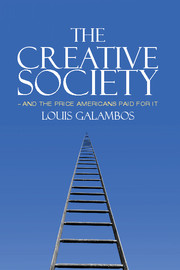Book contents
- Frontmatter
- Contents
- Preface
- 1 1931
- 2 Life, Death, and Learning in the Cities
- 3 Toward a New Economy, 1890 to 1930
- 4 State Crafting – American Style
- 5 Confronting the World
- 6 Winners and Losers, 1890 to 1930
- 7 New Deal Experiments
- 8 Fighting On God’s Side
- 9 The New Aristocracy, 1946 to 1969
- 10 The Suburban Conquest of the 1960s
- 11 Empire in the American Century
- 12 The Tattered Empire of the 1970s
- 13 The Cracked Core
- 14 The American Solution, 1981 to 2001
- 15 Conservatism: Rhetoric and Realities, 1981 to 2001
- 16 The Hegemony Trap
- 17 The American Dream, 1981 to 2001
- 18 The Creative Society in Danger
- Acknowledgments
- Index
- References
14 - The American Solution, 1981 to 2001
Published online by Cambridge University Press: 05 June 2012
- Frontmatter
- Contents
- Preface
- 1 1931
- 2 Life, Death, and Learning in the Cities
- 3 Toward a New Economy, 1890 to 1930
- 4 State Crafting – American Style
- 5 Confronting the World
- 6 Winners and Losers, 1890 to 1930
- 7 New Deal Experiments
- 8 Fighting On God’s Side
- 9 The New Aristocracy, 1946 to 1969
- 10 The Suburban Conquest of the 1960s
- 11 Empire in the American Century
- 12 The Tattered Empire of the 1970s
- 13 The Cracked Core
- 14 The American Solution, 1981 to 2001
- 15 Conservatism: Rhetoric and Realities, 1981 to 2001
- 16 The Hegemony Trap
- 17 The American Dream, 1981 to 2001
- 18 The Creative Society in Danger
- Acknowledgments
- Index
- References
Summary
Apparently down and out by the end of the 1970s, the United States made a remarkable comeback. Nations don't always come back, don't always make it through these transitions successfully. In the early nineteenth century, the British had tremendous advantages on the basis of their success as the “first-movers” in the first industrial revolution. But the British steadily lost out to newcomers in the second industrial revolution. So America's ability to change course, to transform many of its basic institutions and policies, and to recover its leading position in the world economy deserves some serious attention. This recovery is all the more important because it took place against the background of total collapse in the Soviet empire.
As became apparent during these decades, one of the great weaknesses of totalizing, authoritarian polities like the Soviet Union and the People's Republic of China was their tension with professional elites. Fascist regimes have normally had the same problem. The Gulag, the Cultural Revolution, the Nazi assaults on the universities – these experiences stunted the development of professional expertise. Professionals and professional institutions need to be nurtured in loosely controlled environments that foster debate. Authoritarian governments curdle professional discourse by encouraging intellectual and ideological conformity and compliance. The United States had vibrant professional cultures and organizations, and they played an important role in America's recovery from the serious stagflation of the 1970s. Professional elites also helped the European democracies catch up gradually with America's ability to generate productivity increases and economic growth. The professionals on both sides of the Atlantic didn't always get it right, but they gave their societies the kind of public and private expertise essential to economic recovery.
- Type
- Chapter
- Information
- The Creative Society – and the Price Americans Paid for It , pp. 220 - 238Publisher: Cambridge University PressPrint publication year: 2011



